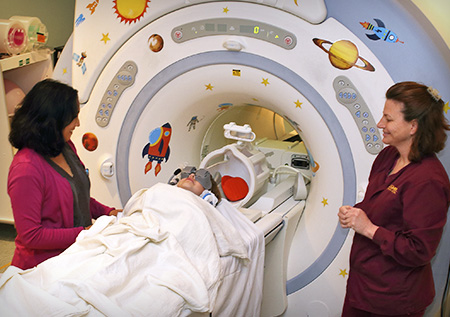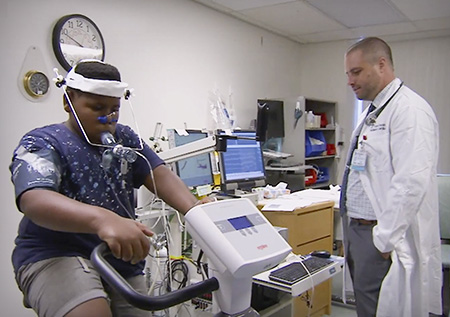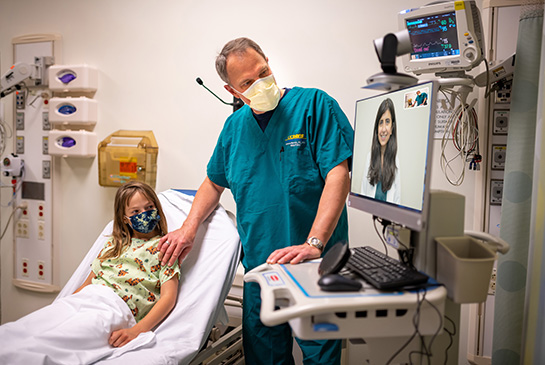Pediatric Heart Center
Diagnostics and testing
Our pediatric heart specialists use a number of diagnostic tools and tests to evaluate, diagnose, manage and plan treatment for infants, children and teens with congenital heart defects.
Cardiac electrophysiology
If your child shows signs of having an abnormal heart rhythm (an arrhythmia), staff from our electrophysiology service will evaluate the heart’s electrical system using an electrophysiology study (EPS). Arrhythmias result when the heart’s electrical system functions abnormally or when there is an extra electrical connection or abnormal electrical focus in the heart.
We may evaluate your child if she has experienced palpitations, unexplained dizziness or fainting (syncope) or if there is a family history of sudden cardiac death. We evaluate children who experience these symptoms, but have normal heart structures, as well as children with previously-diagnosed congenital heart disease.
We perform studies using cardiac catheterization, using state-of-the-art equipment with computerized electrical stimulation and analysis systems. In an EPS, we insert three to five special catheters into your child's veins and guide these catheters to his heart. The tips of each catheter have platinum electrodes that record electrical signals from inside your child’s heart as well as pace the heart from different locations.
Cardiac MRI

Cardiac MRI is a painless, noninvasive test. We use it to take detailed pictures of your child’s heart so that we can examine the structure and function of the heart and blood vessels. Using Cardiac MRI, we can create three-dimensional images of complex heart defects and measure how well the heart is pumping blood.
Cardiac MRI is especially useful for examining anomalies (abnormalities) of the:
- Great arteries, including vascular rings
- Great veins, including patients with heterotaxy syndrome
- Broncho-arterial abnormalities such as double outlet ventricles and superoinferior ventricles
Learn about kid-friendly MRI options, including MRI movie goggles
Echocardiography
During an echocardiographic study (a cardiac ultrasound or echo), we use very high frequency sound waves to form a moving, two-dimensional picture of your child’s heart on a television screen. This enables us to:
- Identify any abnormalities in the structure of your child’s heart
- Evaluate how the heart muscle is functioning
- Measure the speed of blood flow through the heart
- Estimate blood pressure in the different chambers of the heart
Most of the time the pictures are taken using a noninvasive technique called transthoracic echocardiography, during which a small instrument (a transducer), is placed on your child’s skin. Sometimes the pictures are taken from inside your child’s esophagus using an invasive technique called transesophageal echocardiography.
Echocardiography studies can be performed on children of any age and size. Echocardiography can also be used to examine the heart of unborn babies suspected of having congenital heart disease.
Learn more about fetal echocardiograms
Electrocardiography (ECG or EKG)
An electrocardiogram or ECG allows us to measure the electrical activity in your child’s heart. We perform an ECG by attaching electrodes (small patches) to your child’s chest, arms and legs and connecting the electrodes to the ECG machine using lead wires. The ECG machine produces a printout or tracing that we examine to see if it varies from a normal tracing.
The ECG helps us to determine whether your child might have certain heart problems. If your child has had a pacemaker implanted, we may use an ECG to monitor the pacemaker’s function. We may also use an ECG to help us monitor the effectiveness of a heart medication your child is taking or to check his heart after he has had a heart procedure such as cardiac catheterization, heart surgery or an electrophysiology study.
We will usually take a baseline or resting ECG as part of your child’s physical examination. If your child has an exercise test, we compare the exercise ECG with the baseline or resting ECG to see if any changes occur with increasing stress on your child’s heart.


Little Hearts Get a Big Hand | Focus on Health | KVIE Digital Studio
Cardiopulmonary Exercise Testing (CPET)
Exercise testing is a valuable noninvasive tool that we use to identify your child’s functional limits and/or or detect heart and/or lung problems. In an exercise test, ECGs are taken while your child exercises on our treadmill or stationary bicycle so that we can see the effects of increasing stress on his heart.
We use exercise testing to:
- Evaluate your child’s congenital heart and/or lung disease
- Evaluate your child’s cardiac and pulmonary functional capacity
- Assess your child’s symptoms and activity-related problems (fainting, chest pain, exercise-induced asthma, etc.)
- Assess your child’s aerobic and musculoskeletal conditioning
- Learn how medications might affect your child’s exercise performance
- Develop an exercise plan as part of your child’s overall care and treatment plan
While your child exercises, we make periodic adjustments to the treadmill or stationary bicycle so that we can monitor changes in your child’s heart rate, blood pressure, oxygen consumption, carbon dioxide production and pulse oximetry as he exerts himself.
Referrals and appointments
Clinic locations and appointments
Families have access to our full-service Pediatric Heart Center along with the added convenience of six outreach clinic locations.
For referring physicians, please call our patient referrals phone number at 916-734-3456 for assistance with pediatric cardiology services or use on our online referral form.
Pediatric Heart Center - main clinic location
77 Cadillac Drive, Suite 101
Sacramento, CA
Sacramento clinic appointments
Outreach clinics
We have 6 convenient locations in the surrounding communities.


